Keep developing with advanced training
The field of genomics is advancing all the time - new technology, platforms, software and approaches are all being introduced rapidly.
Keeping on top of change can be difficult but the advanced scientific training offered by the Earlham Institute means researchers can benefit from our experienced technical and computational staff and access to the very latest software or platforms.
The Advanced Training team and our expert trainers are passionate about developing skills and knowledge in the bioscience community, as well as inspiring and training future generations of scientists.
A 2022 socioeconomic impact report projected that the scientific training delivered by the Earlham Institute would contribute over £12million to the UK economy over the next decade.
In the last five years, almost 3,500 people have joined the Institute’s training courses, workshops, and networking events. This spans 70 different events, with training delivered virtually throughout the COVID-19 pandemic.
These courses are delivered by a mix of researchers and technical experts and supported by the Institute’s advanced training team.
Dr Emily Angiolini, Head of Advanced Training, says the Earlham Institute has been leading the way in the evolving landscape of genetics and bioinformatics.
“Looking back, the training we were doing in 2017 was very much about the generation of sequencing data and subsequent genome assembly,” she says.
“Today, the sheer amount of data generated by large consortiums like Darwin Tree of Life or the European Reference Genome Atlas means we are concentrating more on techniques for managing and interpreting large quantities of information.
“Our training programme still covers data generation but technology has moved fast, particularly in areas like single cell. More and more we’ve found we also need to offer training in probing and examining results.”


We have a unique training offer at the Institute, there’s a huge variety of science and work goes from sampling, right through the analysis process, to visualisation.

Dr Emily Angiolini
Training at the Institute is particularly geared towards early-career researchers, including PhD students.
Courses can include anything from short workshops teaching best practice in programming and data management to longer, hands-on courses taking in complete research workflows - often incorporating resources and tools developed at the Earlham Institute through its research programmes.
Topics include single-cell technologies and spatial transcriptomics, genome annotation, long-read sequencing, metagenomics, introductory and advanced programming and data management and visualisation.
The Earlham Institute is a proud early adopter of new and emerging technologies, and often is among the first institutions in the UK - or Europe - to secure cutting-edge platforms.
As a result, training courses can provide hands-on access to some of the latest tech, as well as in-person expert advice from those who have worked extensively with them.
Alongside the training, delegates also benefit from a range of supporting information, including videos and informational articles, to help them with personal training and skills development.
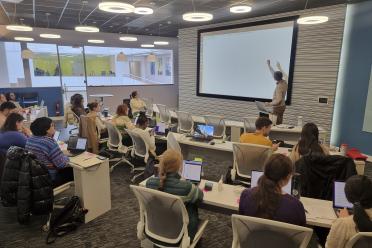
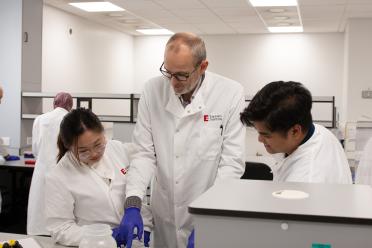
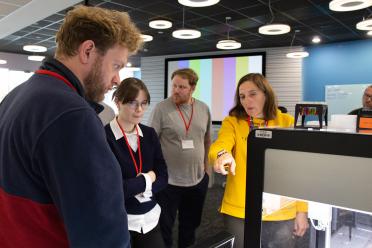
Above: Delegates attending training workshops this year in core computational skills (left) nanopore metagenomics (middle) and laboratory automation (right).
“We have a unique training offer at the Institute,” says Dr Angiolini. “There’s a huge variety of science and work goes from sampling, right through the analysis process to visualisation.
“And our experts work with such a wide variety of species, including non-model organisms.”
The Institute also contributes to the wider life science community through conferences and symposia designed to start conversations and explore emerging technologies. Flagship events include the Norwich Single-Cell Symposium and EI Innovate.
Alongside training and events, the Institute’s Immersive Visitors Training Programme and Year in Industry programme offer an itinerary of activities which will be delivered one-to-one.
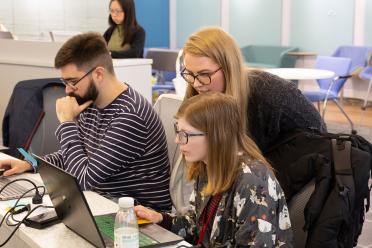

Today, the sheer amount of data generated by large consortiums like Darwin Tree of Life or the European Reference Genome Atlas means we are concentrating more on techniques for managing and interpreting large quantities of information.

Dr Emily Angiolini
Dr Angiolini believes technology will probably evolve just as fast - and just as unpredictably - in the next five years.
“It’s difficult to predict what we’ll be offering in terms of training,” she says. “If we want to continue to offer cutting-edge training - which we do - then we will be adapting to upcoming changes in the bioscience field as well.”
She explains that a lot of upcoming training is aligned with the Earlham Institute’s strategic research programmes - Cellular Genomics and Decoding Biodiversity - which set out directions for the Institute’s research over the next five years of BBSRC funding.
“If you look at Cellular Genomics and Decoding Biodiversity you can see key themes running through them - understanding variation at the cellular level and working towards sustainable biodiverse ecosystems.
“We’ll almost certainly be looking at offering more training in spatial transcriptomics and the single-cell field. Machine learning and AI applications will also play a key part.”
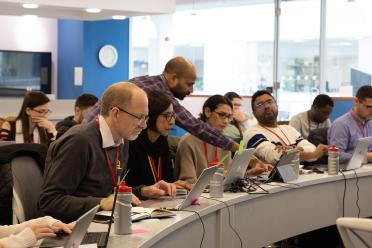
Visit the Training and Events calendar to see the full list of upcoming activities.
To keep abreast of future opportunities, be sure to sign up to our newsletter and follow the Earlham Institute on social media.